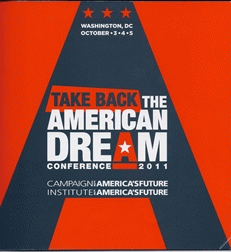To sum up my impression of the first day of the Campaign for
America's Future's annual conference in Washington, DC, Take Back the American
Dream, I'd say that despair comingles with hope among attendees. Despair
because fewer have attended, an indication of the rift between mainstream Democrats
and the left wing that helped elect Obama; but hope because both an older and a
younger element are prominent and working together.
Having walked into the first plenary session about a minute
before it adjourned, I heard Van Jones hurl a four-letter word at Obama:
v-e-t-o. If a Republican-sponsored bill survives both houses but does not serve
the greater good, v-e-t-o.
Agreed.
I attended a breakout session "The 99% Movement: Next
Steps," featuring panelists Sarita Gupta, of Jobs with Justice; Amanda
Devecka-Rinear, of National People's Action; Nelini Stamp, of Occupy Wall
Street; and Ai-Jen Poo, of National Domestic Worker Alliance.
Of Occupy, OEN founder and owner Rob Kall said that it was
the most exciting thing to have happened in the last ten years. "I think there's
more hope there than in electoral politics."
Because the panelists were seated and I was close to the
back, I could only hear them until someone in the very back suggested strongly
that they use the podium. So I'll speak of substance, of which there was a lot,
in lieu of specific names.
The four were all young women, vigorous, inspiring, and
articulate.
After a quick review of the roots of the recession that
triggered Occupy, the subject turned to its many and ongoing accomplishments:
occupying Zuccotti Park and other, public locations throughout the country and
even the world, until that was ruled out, sometimes violently, by the powers
that be.
This "conversation about inequality" has since then grown,
in different directions.
To revise the economy, more people are needed to take
nonviolent direct action. Fifty to sixty thousand activists were trained in
nonviolent protest, said to be the largest-scale training ever (I'd compare
Gandhi's satyagraha, but the panelists were probably focusing on this country).
There is too much separation, rather than coalition, among
progressive organizations. We need more of a shared narrative and somehow to
reach those needing to join up but not yet organized.
In one project confronting corporate power, Occupiers gathered
outside of various shareholder meetings and managed to shut down one held by
Wells Fargo earlier than planned. Verizon moved its meeting to Huntsville,
Alabama, where less of a reaction could be expected. Other Occupiers haunted
Sallie Mae (over the issue of burgeoning student indebtedness) and the Bank of
America.
What else has kept the old/young activists busy: a focus on
CEOs rather than the executive suits that usually smirk in their presence.
Toward this end, lots of new members and strategies are needed.
Occupiers crowded in front of a foreclosed-on home and
successfully deterred City Bank agents from their assignment to empty another
life into the streets (see foreclosethebanks.org, fondly nicknamed
fthebanks.org).
On-campus organizing is also planned, toward more direct
action focused on the student debt monstrosity as well as issues relevant to
racial justice.
(Note: You can view every article as one long page if you sign up as an Advocate Member, or higher).






